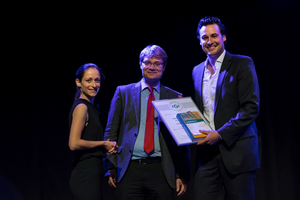The prize, endowed with EUR 2,000, is awarded by the Karl Schlecht Foundation. The non-profit foundation aims at improving leadership in business, society and politics by humanistic values and encourages and supports impact oriented projects and institutions in the funding areas leadership, ethics, education, culture and technology.
The paper examines the impact and signaling effects of crowdfinancing on subsequent venture capital funding rounds. Drawing on a choice experimental research design the author finds causal evidence that crowdfunding – relative to other prefunding sources – is often a negative signal for professional venture investors, but that the “crowd” can nonetheless and under certain circumstances send positive signals increasing the likelihood of subsequent financing rounds.
As early as August, the team of authors consisting of Matthias Dorner, Dietmar Harhoff, Tina Hinz, Karin Hoisl and Stefan Bender was awarded the AoM TIM Best Paper Award for the paper “Social Ties and Quality Signals – Lessons from the Migration of East German Inventors” at the Academy of Management Meeting 2016 in Anaheim, California.
The paper dealt with the impact of social ties and publicly observable performance signals on the migration of knowledge workers. The fall of the Iron Curtain and German reunification were used as a natural experiment for the migration decision of East German inventors.
Results showed that regions with more pronounced social ties across the border prior to the fall of the Iron Curtain attracted more inventors as of 1990. Furthermore, mobility decisions made by inventors with visible performance signals were substantially less impacted by social ties than those of inventors who lacked these signals. The project was conducted with researchers from the Institute for Employment Research (IAB) in Nuremberg.

